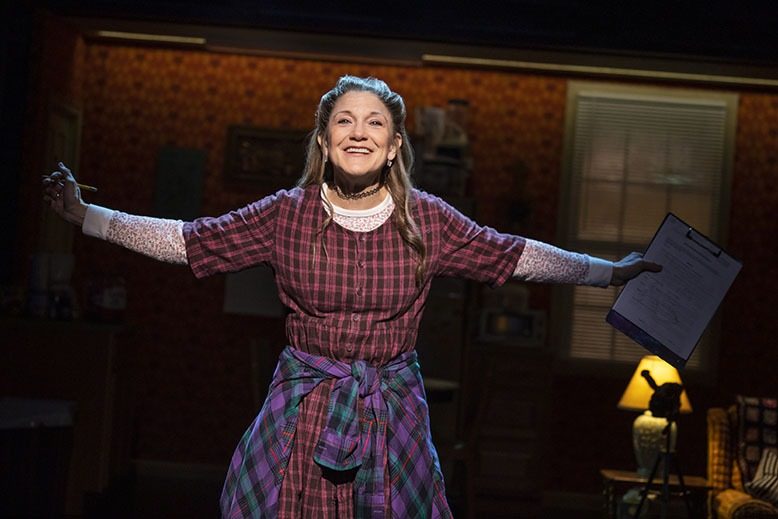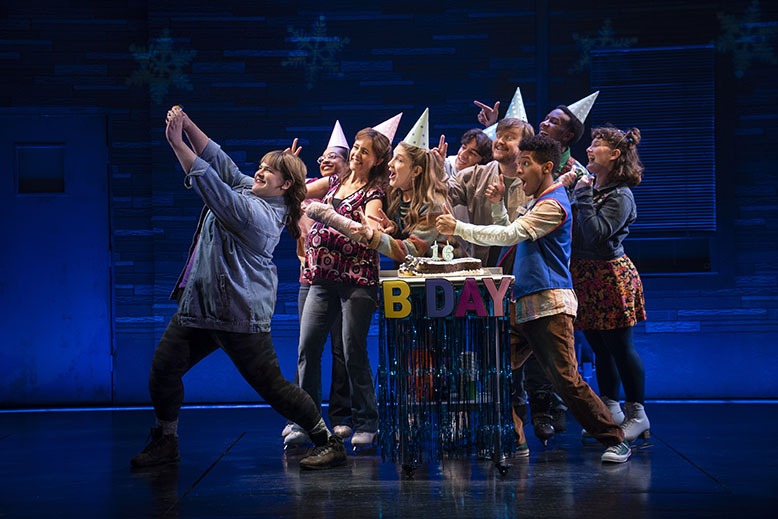
Kimberly Akimbo, a heartfelt new Broadway musical, is putting New Jersey in the spotlight. Not since Jersey Boys has a theatrical production brought so much attention to the Garden State.
The musical, set largely in Bergen County, is a frontrunner to win best musical at the Tony Awards on June 11. Nominated for best new musical, it stars Victoria Clark, who plays Kimberly and was nominated for best leading actress in a musical. (Justin Cooley, a 19-year-old actor making his Broadway debut, was nominated for best featured actor in a musical. Bonnie Milligan, who gets a lot of laughs in the play, was nominated for best featured actress in a musical. Jessica Stone was nominated for best direction of a musical, and David Lindsay-Abaire, interviewed below, was nominated for best book of a musical. The musical was also nominated for best original score—music by Jeanine Tesori and lyrics by Lindsay-Abaire—and best orchestrations.)
The show, a real crowd-pleaser, tells the story of a lonely teenage girl from New Jersey named Kimberly Levaco, who has a health condition that causes her to age rapidly, giving her the appearance of a woman in her early 70s. Since the average lifespan for people who suffer from the condition is 16 years, Kimberly is determined to find happiness in a world where time is running out for her.
The musical is based on David Lindsay-Abaire’s 2001 comedy of the same name.

A scene in Kimberly Akimbo is set in a Bergen County ice skating rink. Photo courtesy of Joan Marcus
Kimberly Akimbo opens with Kimberly about to celebrate her 16th birthday alone at an ice skating rink in Bergen County. The cast sings about Paramus, Ho-Ho-Kus, West Orange and Bayonne. Kimberly’s family refers to something bad that happened when they lived in Lodi, forcing them to move.
“It’s Friday night in Bergen County, and there are parties everywhere,” the opening number begins.
Eventually, Kimberly makes some friends, including Delia, a girl played by South Jersey native Olivia Elease Hardy, making her Broadway debut. Hardy grew up in Sicklerville in Gloucester Township and is the only cast member from New Jersey.
“Since I’m from down south, I didn’t understand the Bergen County jokes,” says Hardy, 24, with a laugh. “Everybody was like, ‘You know about Lodi, right?’ But I didn’t know anything about it.”
She believes New Jersey works well as a setting for the play because it’s one of the most culturally diverse states in the country, so there’s something for nearly everyone to relate to.

South Jersey native Olivia Elease Hardy, far right, is the only cast member from the Garden State. Photo courtesy of Joan Marcus
Hardy says it’s fun to hear the reaction of the audience, especially when it’s obvious they come from one of the towns being mentioned. “I guess being from New Jersey, I’m always in on the joke,” she says. “I’ve had the best time. I couldn’t ask for a better cast, creative team, script and story. I think the show is important, especially right now, since conversations about death and loss have been so prevalent. It’s so important to remind people that you have the option to live life the way you want to live.”
Audience member Josie Harris especially enjoyed a scene about a big competition between Kimberly’s school and her own hometown of West Orange. “I found it very entertaining—I went in not knowing what to expect,” she says.

David Lindsay-Abaire created Kimberly Akimbo, and wrote the lyrics and book for the celebrated Broadway show. He chose to set the play in New Jersey. Photo courtesy of Joan Marcus
Lindsay-Abaire received the Pulitzer Prize for Drama in 2007 for his play Rabbit Hole and has been nominated for several Tony Awards. He also wrote the book for the musicals High Fidelity, Shrek the Musical and Good People.
Lindsay-Abaire, who grew up in South Boston and now lives in Brooklyn with his wife, says the working class Bergen County town in the musical mirrors his own childhood hometown. He spoke with New Jersey Monthly.
How did you come up with the idea for this musical?
It was a play 20 years before it was a musical. And the play came about when I asked a friend about his new baby niece, and he said, “She’s amazing. She’s like this little old woman trapped in a baby’s body,” and that was the seed of the play. As I thought about it, the baby protagonist became a teenager, and I thought, What a great a role for an older actress, to play a character who was dealing with typical teen concerns like crushes and a dysfunctional family, while simultaneously contending with her own mortality.
Many years later, the composer Jeanine Tesori and I were working on Shrek the Musical together, and there were so many people involved on that show and so many producers giving notes, and I said to her, “I’d love to write another musical with you, but I wish we could do it the way I write a play, where there’s no one else involved until we’re ready to share it.” And she loved that idea. So Jeanine was the one who pulled Kimberly off a shelf and said, “I think there’s a musical in here.”
I read that you wanted to set it in Boston, but ended up setting it in New Jersey instead. Can you talk about why you set it in New Jersey?
Honestly, while the play isn’t strictly autobiographical, there is a lot of personal stuff that I channeled into the play, including bits about my family, and I wanted to distance myself from the material to fool myself (and maybe my family members) into thinking I wasn’t writing about my family.
So instead of setting it in South Boston, where I’m from, I set the play in a working class New Jersey neighborhood that felt like South Boston. My friends from Jersey are so similar to the people I grew up with—they’re honest and funny and often prickly on the surface, but have big hearts and gooey centers, and those are the people I wanted in my story. So Jersey is just Southie in disguise.
New Jersey figures prominently in this play—especially towns in Bergen County. Were you already familiar with those towns? How did you come to use them in the play?
Yeah, I have lots of friends and family who are from Jersey or who have lived in Jersey, so I’m pretty familiar with it, especially Bergen County. Plus, we have several Jersey folks on the Kimberly team, both onstage and behind the scenes, who were there to keep me honest if something didn’t feel quite right to them. If I ever had a question, I had several experts on hand. And as a writer, the more specific I could be, the more truthful and authentic the story would feel, so that’s how all the Jersey details got sprinkled in.

Audience members from New Jersey have told Kimberly Akimbo‘s creator, David Lindsay-Abaire, that the show “feels like home.” Photo courtesy of Joan Marcus
Have you had feedback from Jersey residents who attend the play? Were they excited to hear their towns mentioned?
One of the most gratifying things to me as a writer on this show is when someone from Jersey tells me that the show feels like home to them. They love the town shout-outs and the various locations mentioned. Although we deliberately don’t mention exactly where in Bergen County Kimberly lives, I’ve had several audience members tell me that they know precisely which ice skating rink is being referenced in the show. Then another audience member will say, “No, it’s another rink,” and they argue with each other. I love that.
Did you think it would be funny to set it in New Jersey?
I understand that, to a lot of people, Jersey can be a punchline, but I was never interested in making fun of Jersey or having a laugh at Jersey’s expense. So it’s always surprising to me when people say, “There are so many Jersey jokes in the show!” There actually aren’t.
There are lots of Jersey references and towns mentioned, and sometimes the audience will laugh at that, but I think that’s more because they’ve been conditioned to believe that Jersey [is a] laugh line. But as the writer, I’m not usually trying to get a laugh in those moments; I’m just telling the audience where we are. And sure, some of the teenage characters complain about their town and wanting to escape it, but that’s a universal experience. It’s exactly what I felt growing up in Southie, and what friends of mine felt. Their longing to be somewhere else isn’t about New Jersey; it’s about teenagers dreaming of a different life. Who doesn’t want to escape where they’re from?
No one knows New Jersey like we do. Sign up for one of our free newsletters here. Want a print magazine mailed to you? Purchase an issue from our online store.
